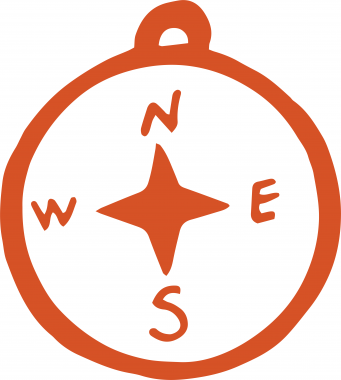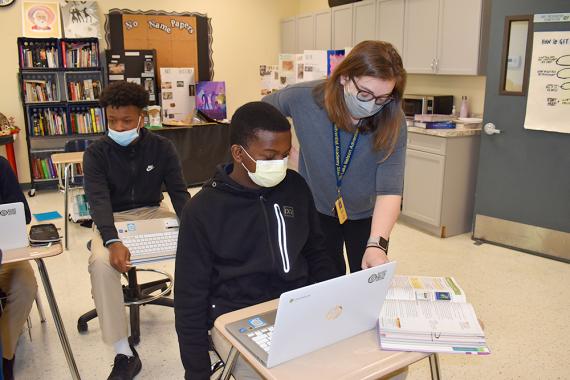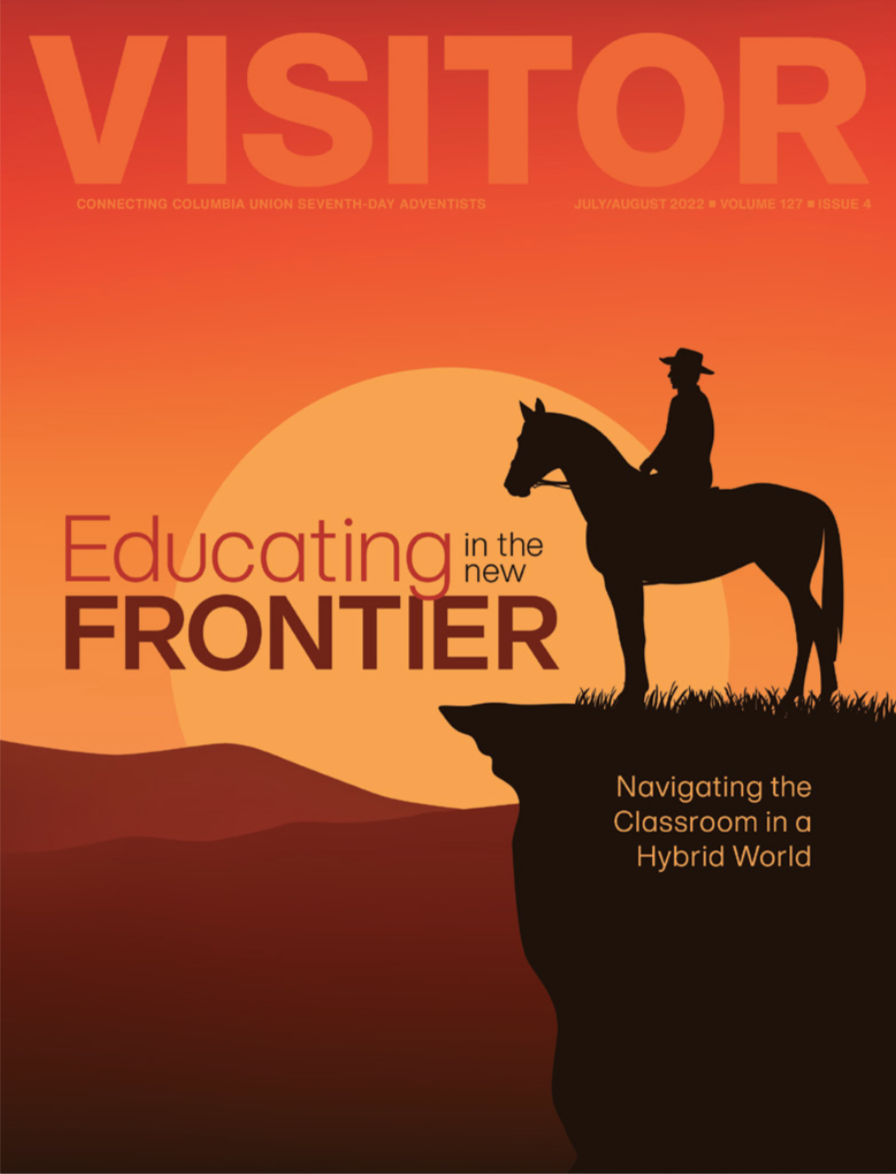
Educating in the New Frontier
Story by Tamaria L. Kulemeka
Educators have embraced the new frontier of hybrid instruction and have adapted their classrooms in a way that would never have been conceived prior to the pandemic shutdown.
Unexplored Territory
Though Columbia Union Conference schools have returned to in-person learning, many of them continue to offer a virtual option for the unforeseen future.
For Yoel Paredes, vice principal, chaplain and teacher at New Jersey Conference’s Waldwick Adventist School, the pandemic created an opportunity to expand the school’s reach. The school provides instruction for about 100 kindergarteners through 10th-graders. However, after sophomore year, students have had to move on to other schools—until the pandemic forced schools into virtual learning mode. As a result, this past school year Waldwick partnered with Lake Nelson Adventist Academy (LNAA)—located in Piscataway, N.J.—which has a satellite program that enabled eight of Waldwick’s juniors and seniors to continue taking classes without ever leaving their campus.
“Today our 11th- and 12th-graders don’t need to be in person. ... They can just get on Zoom,” says Paredes. “Some of [the students] were in this school since they were in first grade, and if it wasn’t for this program, they would have left.”
Paredes says the idea to partner with LNAA was sparked after Waldwick provided similar services during the 2020–21 school year to ninth- and 10th-graders at the conference’s Vine Haven Adventist School (N.J.), which only goes up to eighth grade. Paredes says Waldwick even had an international student attend online classes after the student had to return home because of the pandemic.
LNAA, which initially provided virtual learning for their students in March 2020 until the end of that school year, resumed in-person learning in a hybrid fashion for the 2020–21 school year. At that time, LNAA students had three options: attend classes three days a week, four days a week, or remain completely virtual. The school, which has 293 students, added the satellite program during the 2021–22 school year. Besides the eight students from Waldwick, the program served seven students from Vine Haven, and, pending approval, Elisa Maragoto, LNAA’s principal, says the Tranquility Adventist School in Andover, N.J., could be joining the satellite program next school year.
While they knew there would be challenges, Ashley Boggess, LNAA’s high school English teacher and junior and senior art history teacher, says she and LNAA teachers felt very comfortable offering virtual classes to students at other campuses while teaching their own students in person at the same time. To aid their delivery, the school added microphones on computers so virtual students could better hear the teachers. In addition, classrooms are now equipped with a remote-control camera and speaker positioned on the ceiling so students can see the teacher no matter where they move in the room. They also added Promethean boards to enhance in-person and virtual instruction.
Most beneficial in making the partnership a success is the “close relationship” forged among the school principals and facilitators at the other schools. Boggess says the satellite campus facilitators ensure their students are on task, allowing her and other teachers delivering instruction to focus on “teaching in the moment.”
 Boggess, pictured assisting Christopher Anderson in English class, says she is thankful for leaders seeing wisdom in extending learning in a way that would not have been conceived before the pandemic. “We’ve all been working very closely with each other to support one another on this journey,” she says.
Boggess, pictured assisting Christopher Anderson in English class, says she is thankful for leaders seeing wisdom in extending learning in a way that would not have been conceived before the pandemic. “We’ve all been working very closely with each other to support one another on this journey,” she says.
Virtual learning has opened numerous possibilities, and, during a time when many Adventist schools are struggling financially, Paredes believes the Adventist Church needs to capitalize on this idea and seek ways to “create an online academy to reach the rest of the world.” This, in turn, would better connect students no matter what city, state or country they live in, says Paredes, whose students have engaged via Zoom with classrooms in his native Peru as part of a language-exchange activity.
“You know the students feel like our schools are small, but if you’re realizing we’re connected, even if it’s virtually, then we can give them the sense that we belong to a bigger system,” says Paredes.
Circle Your Wagons
Allegheny East Conference school leaders and staff can also attest to the benefits of what can be accomplished when schools come together. At the height of the pandemic, the conference joined its seven schools to form a consortium, or what John Alberty, superintendent of education, readily refers to as “one big school.” This allowed for the conference’s kindergarten through eighth grade schools to share teachers and resources, as more than 150 students and about 10 teachers met daily on Zoom. These teachers taught classes for the entire group during the 2020–21 school year.
“Students were able to break out into English Language Arts, social studies, math and science [virtually]. The music teacher, the Spanish teacher and other exploratory teachers were able to share resources across schools,” Alberty says. “Because of that, we didn’t lose any teachers and didn’t have to lay anyone off.”
Alberty says the consortium school even served a student who lived outside the country during that time. Today, sharing resources and some classes continue among the schools.
For example, some upper-grade students at Sharon Temple Adventist School in Wilmington, Del., take classes with students from Baltimore Junior Academy, “now that we have the appropriate platform to do that,” Alberty says, adding that the schools continue to offer a virtual option for parents who are still not comfortable sending their kids back to school.
“Teaching in person and virtually at the same time is not easy, so I commend my teachers ... who are our biggest commodity,” he says.
As for the conference’s only high school and boarding school, Alberty says, “When the rest of the world shut down, we did not close Pine Forge Academy (PFA) in Pennsylvania. They created a bubble, and there was no one on or off campus besides the teaching staff.”
The school’s Music and Creative Arts departments found innovative ways to engage students and “reached their stakeholders and the community” through innovative virtual programs and productions that brought PFA to a larger audience digitally, says Alberty, something the school intends to continue to do.
“This group of students had a connection and core memory that will always be uniquely theirs and will last them a lifetime!” says Jarrett Roseborough, PFA’s choir director.
Protecting the Fold
 Many educators agree that one of the biggest takeaways from life spent in pandemic mode is that mental health matters. “There are a lot of issues that people are struggling with,” says Janet Armstrong, associate superintendent of education for the
Many educators agree that one of the biggest takeaways from life spent in pandemic mode is that mental health matters. “There are a lot of issues that people are struggling with,” says Janet Armstrong, associate superintendent of education for the
Potomac Conference. “A few teachers talked about students who told them they were depressed when schools were virtual. Some of students had contemplated self-harm or even thought about suicide.”
Armstrong was among several educators who signed up to become a mental health first aid trainer when Donovan Ross, vice president of education for the Columbia Union, announced his ambitions of offering this training. Armstrong said the three-day course equips trainers with tools necessary to “point [students and staff] in the direction of getting help.”
Armstrong says the issues people have experienced during the pandemic won’t just go away now that things are starting to “get back to normal.”
Armstrong is gearing up to train teachers throughout the Potomac Conference, which has 17 schools. “COVID-19 has kind of helped take away the stigma about talking about mental health and selfcare, so that has been a silver lining. As more and more educators are made aware of signs to look for, questions to ask and how to respond, this can help our students know how to help themselves and their friends when someone is feeling overwhelmed and doesn’t know what to do,” Armstrong says.
Giddy Up, Little Children
During the shutdown mode of the pandemic, the primary focus of Allegheny West Conference’s Ramah Junior Academy in Cleveland was to help families cope and thrive mentally, socially, emotionally, spiritually and physically, according to Celeste Giles, Ramah’s principal.
“[During the pandemic] was the first time we drove to every single student’s home,” says Giles. “We met with them and took different [care] packages to them. We knew the isolation had affected some of them.”
 In addition to distributing more than 1,000 breakfast, lunch and snack bags weekly, the school provided close to $1,000 worth of sensory fidgets and other social-emotional toys to give students an outlet to combat isolation at home and the inability to interact in person with their friends at school.
In addition to distributing more than 1,000 breakfast, lunch and snack bags weekly, the school provided close to $1,000 worth of sensory fidgets and other social-emotional toys to give students an outlet to combat isolation at home and the inability to interact in person with their friends at school.
“The fidgets gave them a sense of calmness and peace … if they felt stressed,” says Giles, who added the fidgets increased the students’ ability to focus on the task [at hand] and pay attention more readily.
Looking ahead, Giles says she and her staff are seeking ways to “gap the learning loss” incurred at the height of COVID-19.
In addition to using fidgets and other socialemotional toys as part of the daily routine, Giles said the school also provides music and art twice a week to meet students’ emotional needs. “Music and art utilized as therapy is soothing and relaxing and has enabled students to de-stress and release anxiety,” she says.
Despite the need for in-person instruction, Giles agrees with many educators that virtual learning has become an essential component of education. She says Ramah plans to offer online classes with a dedicated online teacher next school year.
“Virtual is here to stay in some capacity,” Giles says. “We’re moving to a new style of learning, so we have to adapt and grow with it. That’s what we’re trying to do.”
Editor’s Note: The July/August 2022 Visitor feature has been revised online for accuracy and clarity. Since press time, the Visitor staff has learned that the Pennsylvania Conference does not operate any homeschool programs. It should be further noted that the Gettysburg Seventh-day Adventist Church has suspended operation of the Gettysburg Adventist Christian School for the 2022–23 school year. We regret any confusion.
 July/August 2022 Visitor:
July/August 2022 Visitor:
- Educating in the New Frontier
- Editorial: A Heartfelt Thanks
- Eveillard Children Learn Virtually From Coast to Coast
- How One Music Teacher Thought ‘Outside the Screen’
- Keeping Our Kids in Adventist Schools
- ACSGW Launches Healthy Child 1000
- Columbia Union Educators of the Year Announced
- Meet the 2022 Caring Heart Award Winners

Add new comment